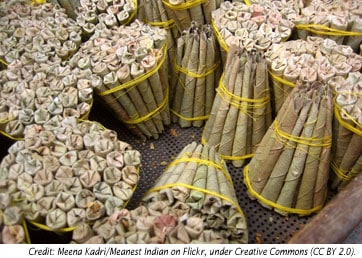
 SAMBALPUR, ODISHA, India (WOMENSENEWS)–Namita Bag was first diagnosed with tuberculosis 10 years ago, when she was just 15.
SAMBALPUR, ODISHA, India (WOMENSENEWS)–Namita Bag was first diagnosed with tuberculosis 10 years ago, when she was just 15.
Doctors warned her that her condition was the result of seven years of rolling beedis, a job that entails placing raw tobacco in dry tendu leaves.
In the past decade she has been hospitalized three times.
Now, at 25, she is a frequent face at the small dispensary for beedi workers in her village of Rengali, in Sambalpur district.
Her father, also a beedi roller, died from respiratory complications some years ago. But that didn’t stop her from rolling beedis. In fact, her father’s death left the family without his income and made any thoughts of leaving the work that much harder.
"I have to take care of my ailing mother and my four younger siblings so I cannot avoid this work," she says with a shrug.
Female beedi workers can expect to earn only between $4 or so a week for rolling between 3,500 and 4,000 beedis. Beedis are smoked like cigarettes but deliver more nicotine and tar. They accounted for 48 percent of Indian tobacco consumption in 2008.
Dr. S.N. Mohanty, a doctor working in a federal dispensary at Regali village, believes that ingesting tobacco also hurts reproductive health. "Although no survey has been done here on the health of women beedi workers, 80 to 85 percent of them are malnourished, experience frequent abortions and miscarriages and give birth to stillborn or low-birth weight babies."
Bilasini Bag, 35, another beedi worker, has suffered two miscarriages. She works with her 2-year-old son often lying on her lap.
"I know this tobacco dust is bad for my baby, but where can I leave him? He is already suffering from breathing problems," she says.
Female-Dominant Job
There are hundreds of beedi-rollers in Odisha’s Jharsuguda and Sambalpur districts and the majority of them are women who work from home.
The All India Beedi, Cigar, and Tobacco Workers’ Federation estimates that women make up between 90 and 95 percent of those employed. Their children can often be seen working alongside them, rolling beedis in the open courtyards or verandahs of their homes at all times of the day.
Women and children are often considered ideal for beedi rolling for their soft and supple hands.
"I used to roll beedis as a child," says Satyananda Lohar, 45, of Rengali village. "But now my hands are too hard and rough for beedi rolling and the ones I make get rejected. So I do wage labor–whenever I get it–while my wife and my daughter roll beedis."
In 2008 the Odisha government set the minimum wage for rolling 1,000 beedis at about $1.30. While meager, few workers earn even that much.
Beedi manufacturers, typically pay about $1 to middle men or "contractors" who then take a certain share for themselves.
One worker, Bui Bag, of Kurla village in Sambalpur district, says her middle man commonly says that 10 percent or 20 percent of her beedis are rejected for being not well rolled. She doubts that, but can do nothing about it. "I have no way of checking and just have to accept whatever I am paid."
The constant exposure to tobacco dust leaves a high degree of chronic bronchitis, tuberculosis and cancer among the workers, who wear nothing to protect themselves–no gloves or masks.
Workers also often suffer from cramps and aches in the shoulders, neck, back and lower abdomen and eye problems.
"I sit for 10 to 12 hours at a stretch with my head bent in one position in a small, dark room," says Bui. "This has left me with a constant back pain. My children also have similar complaints."
Home-Based Convenience
Women such as Bui say they’d rather roll beedis than perform agricultural labor, because of the convenience of working from home.
National laws mandate identity cards for beedi workers and access to health insurance, maternity benefits, housing assistance and scholarships for their children. A card-carrying beedi worker is supposed to get up to $143 reimbursement for tuberculosis treatment, and $204 in death benefits for survivors.
But those entitlements remain only on paper, says Shantilata Lohar, a beedi worker from Khaliapali village.
"We are deprived of all facilities. The only dispensary here is meant for coughs, colds and fevers. No medicine is available for serious conditions like cancer, and we cannot afford treatment offered by a big hospital, like the Burla Medical College Hospital in Sambalpur district, which is 100 kilometers [about 60 miles] away."
By law, the government should provide one dispensary for every 5,000 workers. But Dr. Mohanty’s dispensary, set up in 1987, is the only facility in the region where beedi workers and their dependant family members get medical treatment free of cost. It has only one pharmacist, a nurse and an assistant to cover around 100,000 workers.
"A proposal for establishing a hospital at Rengali has been pending since 2002 and the district administration has earmarked 20 acres of land in Rengali for that purpose," says Mitrabhandu Podh, general secretary of the Nikhil Orissa Beedi Worker Federation in Bhubaneswar. "We have been demanding a 50-bed hospital here, but so far we have been ignored, although hospitals are being built in other places by the labor welfare administration."
Would you like to Comment but not sure how? Visit our help page at https://womensenews.org/help-making-comments-womens-enews-stories.
Would you like to Send Along a Link of This Story?
https://womensenews.org/story/labor/111017/job-rolling-tobacco-sickens-indias-women
This article is adapted from one that was released by the Women’s Feature Service. For more articles on women’s issues log on to: http://www.wfsnews.org.
Sarada Lahangir is an Orissa-based journalist. She wrote this article with assistance from the Panos South Asia Media fellowship on tobacco.


